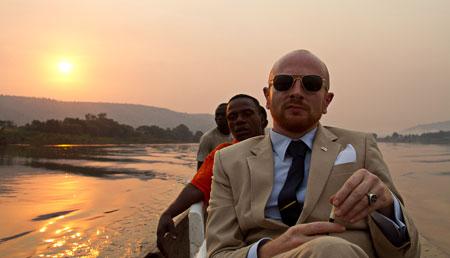That's exactly why "The Ambassador" is so refreshingly provocative, shocking and, indeed, truthful. In a time when the media have no qualms about treating politicians like reality show contestants and no one seems to question whether breaking the news first is always such a good idea, it's more than welcome to see someone deliberately cross the line and raise important questions. Is the line really in the right place? Who even put it there? And isn't it better to cross the line in an original manner than unthinkingly and uncritically toe it?
Is it okay for Brügger to travel in an African country as a diplomat, while filming his experiences as a documentarian and a reporter? Of course not. That's precisely why "The Ambassador" hits home so hard.
Indirectly, though loudly and clearly, Mads Brügger raises those questions in "The Ambassador", a film that paints an unfathomably grim but also surprisingly funny picture of an Africa that is being ruthlessly raped by everyone, from Europeans and North Americans to Indians, Russians and Chinese.
To anyone blissfully deluding themselves that Mother Africa, humanity's womb, is finally recovering after years of civil war, massacres and general post-colonial madness: Don't see this film. It offers no hope.
Diplomatic Immunity
"The Ambassador's" journalistic impropriety mainly lies in Brügger's method. He didn't travel to the Central African Republic as a conventional journalist jotting things down on his notepad. He went as the diplomat Mr Cortzen – which is not, by the way, a false identity.
Early in the film, Mads Johan Brügger Cortzen, as is our protagonist's full name, visits a pair of shady characters who offer to provide him with a diplomatic passport from an African nation. In Portugal, one of them, a British former elite soldier, takes Brügger aside and, not knowing that Brügger is carrying a concealed camera, tells him that the title of ambassador is immense valuable. If he uses it right, he could take an enormous amount of wealth out of Africa, protected by diplomatic immunity. If he screws up, he could end up dead in a ditch.
As he waits for the Liberian authorities to process his new title, Brügger travels to the Central African Republic on a fake diplomatic passport. "If Congo is Africa's heart, the Central African Republic is the continent's appendix," he says. It is a forgotten country that has suffered the vagaries of several mad presidents. According to the country’s chief of security, a Frenchman, the Republic is still being cynically controlled by its former colonial overlord, France.

"The Ambassador". Photo: Johan Stahl Winthereik.
Drunken Pygmies
Under the cover story that he is looking to open a match factory, Brügger, aka Mr Cortzen, acts like a caricature of a white man whooping it up in Africa. Without much effort, he hooks up with a mine owner, Monsieur Gilbert, who is up for some shady business with Mr Cortzen. Since so much money is already flowing under the table, the Liberian ambassador meets with very little resistance wherever he goes.
It's all thoroughly disillusioning. Meanwhile, Brügger's diplomat act gets him into situations that are beyond absurd. At one point, he visits a Pygmy village to find workers for his match factory – in some parts of Africa, Pygmies are believed to have magical powers, which would obviously be an advantage for Brügger's matches. As if it were the most natural thing in the world, Brügger's African connections have plied the entire village with alcohol, including the children.
Queasy Morbid Humour
Clinking glasses with Mr Gilbert, Brügger pulls out a bottle of Möet & Chandon champagne, telling him it's the last thing Hitler drank before he took his own life in the bunker. This prompts Brügger's African assistant to tell a story of how Hitler had a pillow stuffed with the pubic hair of Jewish women. The Africans conclude that Hitler was full of funny stories. The whole grotesque affair is a good example of the picture of Africa painted in "The Ambassador". It's queasy, morbid humour of the highest grade.
There are dozens of such moments. One of the best and most complex comes when Brügger takes a boat ride on a gorgeous river with two helplessly drunk Pygmies to the sound of Woody Guthrie's "This Land Is Your Land". Irony doesn't get much more biting than that.
"The Ambassador". Photo: Johan Stahl Winthereik.
Fetishistic Boyhood Dream
But, is it okay for Brügger to travel in an African country as a diplomat, while filming his experiences as a documentarian and
a reporter? Is it okay that Brügger is clearly acting out an old, fetishistic boyhood fantasy of strutting around darkest Africa
in long riding boots, chomping on a cigarette holder? Of course not. That's precisely why "The Ambassador" hits home so hard.
This is no simple documentary. It scolds, it provokes, it hurts and it asks questions that are a lot more complicated, unpleasant and, not least, entertaining than any conventional piece of journalism could ever make them.
"The Ambassador" is far from pure in its tone or in its heart, precisely because it knows the questions are so much more interesting when you step out of the norms. Balancing on umpteen moral precipices, the film is at times so grotesque that you can barely believe your eyes. It's way over the line. But the crucial thing is that it crosses the line with an ingenuity that any reporter must admire.
This essay first aired on DR TV's arts programme "Filmland".
Read Per Juul Carlsen's interview with Mads Brügger, "The Man with the Yellow Hat Gone Bad", in FILM#72.

